Relationship PLO
Mathematics Education
Relationship PLO Mathematics Education Study Program
| No | Subject Specific Criteria ASIIN | PLO 1 | PLO 2 | PLO 3 | PLO 4 | PLO 5 | PLO 6 | PLO 7 | PLO 8 | PLO 9 | PLO 10 | PLO 11 |
| 1 | Possesses profound knowledge of the fundamentals of abstract and applied mathematics as well as at least one minor subject | √ | ||||||||||
| 2 | Is able to identify and explain the quality of simple mathematical problems | √ | ||||||||||
| 3 | Is able to generalize simple mathematical problems | √ | ||||||||||
| 4 | Is able to use fundamental mathematical statements to solve simple mathematical problems | √ | ||||||||||
| 5 | Is able to formulate fundamental mathematical hypotheses | |||||||||||
| 6 | Recognizes the formal structure of simple mathematical problems | √ | ||||||||||
| 7 | Formally and correctly proves simple | |||||||||||
| 8 | Masters fundamental strategies | |||||||||||
| 9 | Implements simple, mathematical processes on the computer | √ | ||||||||||
| 10 | Within the framework of Bachelor activities, works on a simple and clearly defined scientific task and is able to adequately present the results orally and in writing | √ | √ | |||||||||
| 11 | the fundamental ability to independently deepen and expand the acquired knowledge (Lifelong Learning). For this, graduates are mainly familiar with fundamental learning and work strategies and have built their first experiences with handling scientific literature, | √ | √ | |||||||||
| 12 | the ability to adequately communicate about topics within their discipline orally as well as in writing, as suited to their audience (Communicative Competencies) | √ | ||||||||||
| 13 | first experiences with teamwork | √ | √ |
| No | PLO \ KKNI | 6.1 Able to apply their fields of expertise and take advantage of science andtechnology in solving problems and able to adaptto the situation | 6.2 Mastering in the general and particular theoretical concepts of knowledge andable to formulate theprocedural problems solving | 6.3 Able to make correct decisions based on analysis ofinformation and data, and able to provide guidance in choosing various alternative solutionsindependently and groups | 6.4 Responsible for his/her own work andcan be given responsibility for the achievement of the work of theorganization |
|---|---|---|---|---|---|
| 1 | Recognizes the formal structure of simple mathematical problems in basics mathematics and advance mathematics to support the professional competence of teachers and further studies | v | |||
| 2 | Graduates are able to design innovative learning based on the concept of mathematics educationand learning. | v | |||
| 3 | Graduates are able to design mathematics learning media, both manipulative learning media and ICT- based learning media. | v | |||
| 4 | Graduates are able to designresearch in the field of mathematics education | v | |||
| 5 | Graduates are able to use general knowledge concepts to support professional teacher competencies. | v | |||
| 6 | Graduates are able to produce innovative work, in the fields of education and entrepreneurship | v | |||
| 7 | Graduates demonstrate oral andwritten communication skills | v | |||
| 8 | Graduates are able to demonstrate skills / skills to use ICT | v | |||
| 9 | Graduates can carry out innovative mathematics learning | v | |||
| 10 | Graduates are able to show a responsible attitude in their own work and can be given responsibility for the achievement of group work | v | |||
| 11 | Graduates are able to demonstrate good workplace and social ethics | v |
| Ranah | No | PLO | Kode | P.1 | P.2 | P.3 |
|---|---|---|---|---|---|---|
| Knowledge | 1 | Graduates are able to recognizes the formal structure of simple mathematical problems in basic mathematics and advance mathematics to support the professional competence of teachers and further studies. | P1 | Very Strong | Very Strong | Very Strong |
| 2 | Graduates are able to design innovative learning based on the concept of mathematics education and learning. | P2 | Very Strong | Strong | Strong | |
| 3 | Graduates are able to design mathematics learning media,both manipulative learning media and ICT-based learning media. | P3 | Very Strong | Very Strong | Very Strong | |
| 4 | Graduates are able to design research in the field of mathematics education. | P4 | Strong | Very Strong | Strong | |
| 5 | Graduates are able to use general knowledge concepts to support professional teacher competencies. | P5 | Strong | Strong | Strong | |
| General Skill | 6 | Graduates are able to produce innovative work, in the fields of education and entrepreneurship. | KU 1 | Strong | Strong | Very Strong |
| 7 | Graduates are able to demonstrate oral and written communication skills. | KU 2 | Very Strong | Very Strong | Very Strong | |
| 8 | Graduates are able to demonstrate skills / skills to use ICT. | KU 3 | Very Strong | Very Strong | Very Strong | |
| Special skills | 9 | Graduates are able to carry out innovative mathematics learning. | KK | Very Strong | Very Strong | Strong |
| Affective | 10 | Graduates are able to show a responsible attitude in their own work and can be given responsibility for the achievement of group work. | A1 | Very Strong | Very Strong | Very Strong |
| 11 | Graduates are able to demonstrate good workplace and social ethics. | A2 | Very Strong | Strong | Strong |
| Knowledge 1 | Knowledge 2 | Knowledge 3 | Knowledge 4 | Knowledge 5 | General Skill 1 | General Skill 2 | General Skill 3 | Special Skill | Affective 1 | Affective 2 | |
|---|---|---|---|---|---|---|---|---|---|---|---|
| (PLO 1) | (PLO 2) | (PLO 3) | (PLO 4) | (PLO 5) | (PLO 6) | (PLO 7) | (PLO 8) | (PLO 9) | (PLO 10) | (PLO 11) | |
| Religion Study | M | H | |||||||||
| Educational psychology | H | H | |||||||||
| Calculus | H | L | |||||||||
| General Physics | H | L | |||||||||
| Introduction Basic Mathematics | H | L | |||||||||
| Basic Algebra and Trigonometry | H | L | |||||||||
| Computer application | H | L | |||||||||
| Pancasila Education | M | H | |||||||||
| Administration and Educational Supervision | H | M | |||||||||
| General biology | H | L | |||||||||
| General Chemistry | H | L | |||||||||
| Plane and Space Geometry | H | L | |||||||||
| English for Mathematics | H | H | L | ||||||||
| Advanced Calculus | H | L | |||||||||
| Indonesian | H | H | L | ||||||||
| Basics Educational Science | H | L | |||||||||
| Plane and Spaces Geometry Analytic | H | L | |||||||||
| Elementary Statistics | H | L | |||||||||
| Psychology of Mathematical Instructions | H | M | |||||||||
| Elementary Linear Algebra | H | L | |||||||||
| Number Theory | H | L | |||||||||
| Civic education | M | H | |||||||||
| Introduction of Counseling | M | H | |||||||||
| Mathematics Instruction Strategies | H | H | M | ||||||||
| Abstract Algebra | H | L | |||||||||
| Vektor Calculus | H | L | |||||||||
| Study Middle School Math Curriculum | H | L | |||||||||
| Algorithms and Programming | H | H | L | ||||||||
| English | H | H | L | ||||||||
| Schooling Field Practice 1 | H | H | H | H | H | L | H | ||||
| Mathematics Learning Design | H | H | M | ||||||||
| Evaluation of Mathematics Learning | H | H | M | ||||||||
| Mathematics Learning Media | H | H | H | M | |||||||
| Mathematical Statistics 1 | H | L | |||||||||
| Ordinary Differential Equations | H | L | |||||||||
| Discrete Mathematics | H | L | |||||||||
| Entrepreneurship | H | L | M | ||||||||
| University Elective Courses | M | L | |||||||||
| Schooling Field Practice 2 | H | H | H | H | L | H | |||||
| Micro Teaching | H | H | H | H | L | ||||||
| Educational Research Methods and Teaching Mathematics | H | H | M | M | L | ||||||
| Introduction to Operations Research | H | L | |||||||||
| Real Analysis 1 | H | L | |||||||||
| Geometry Transformation | H | L | |||||||||
| Advanced Computer Applications | H | L | |||||||||
| History of Mathematics | H | M | L | ||||||||
| Actuarial | H | L | |||||||||
| Schooling Field Practice 3 | H | H | H | H | L | H | |||||
| Undergraduate Thesis Seminar | H | H | H | H | L | ||||||
| Undergraduate Thesis | H | H | H | H | H | L | M | ||||
| Sampling Technique | H | L | |||||||||
| Community Internship | H | H | L | M | |||||||
| Applied Regression Analysis | H | L | |||||||||
| Multivariate Analysis | H | L | |||||||||
| Finite Group Theory | H | L | |||||||||
| Introduction to Topology | H | L | |||||||||
| Mathematical Statistics 2 | H | L | |||||||||
| TFV Complex 1 | H | L | |||||||||
| Mathematical Modeling | H | L | |||||||||
| Databases | H | L | |||||||||
| Real Analysis 2 | H | L | |||||||||
| Numerical Method | H | L |












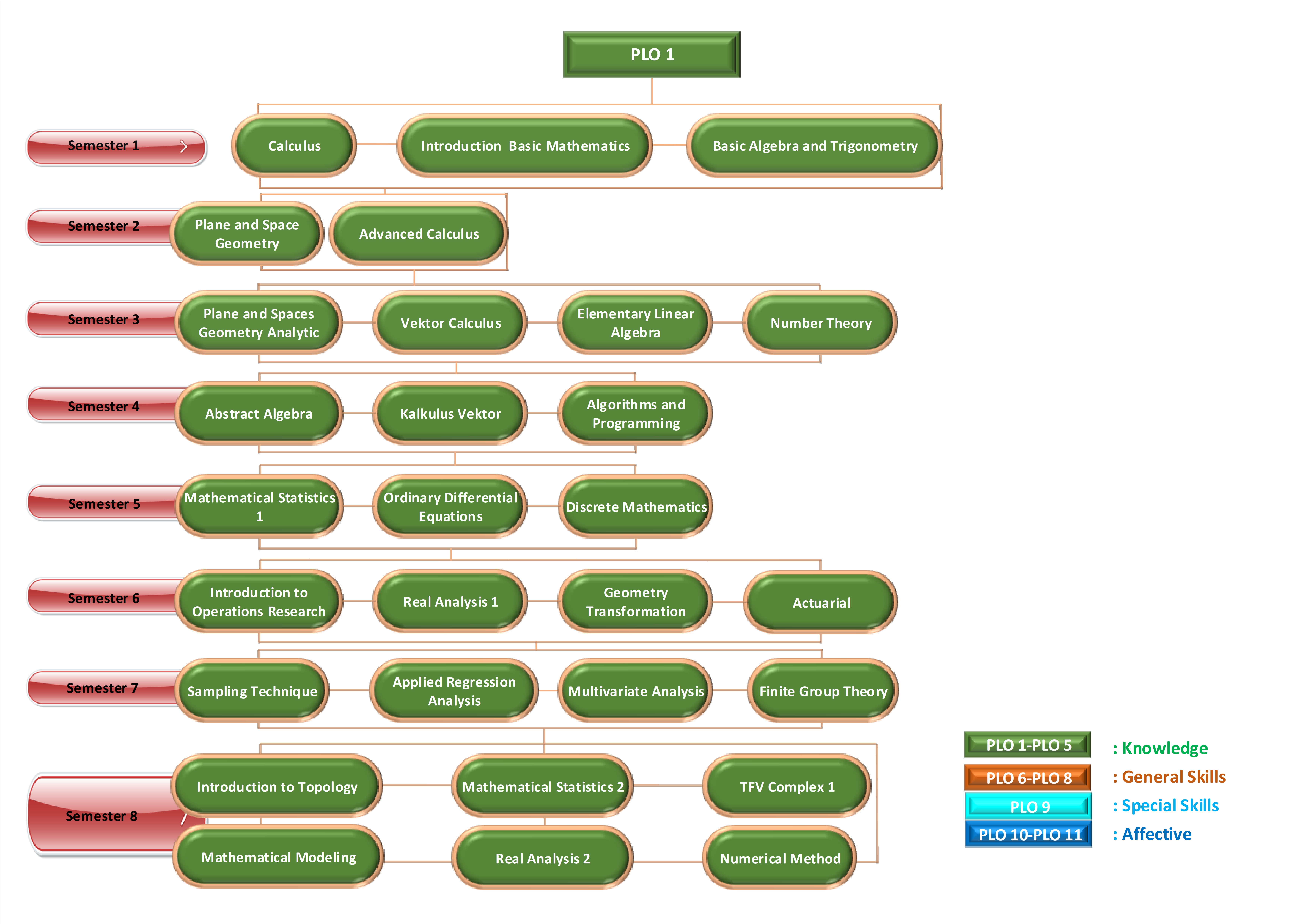
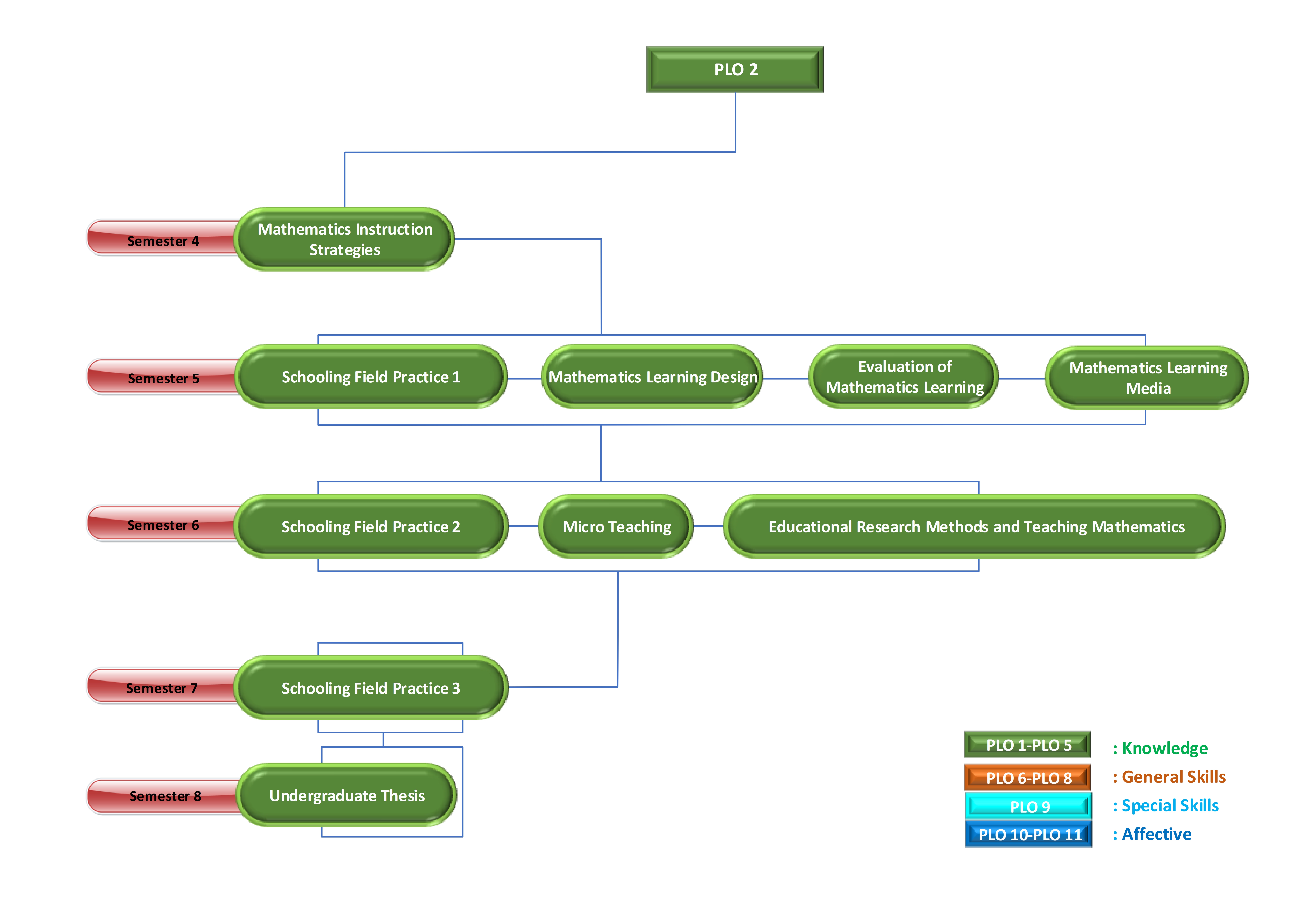
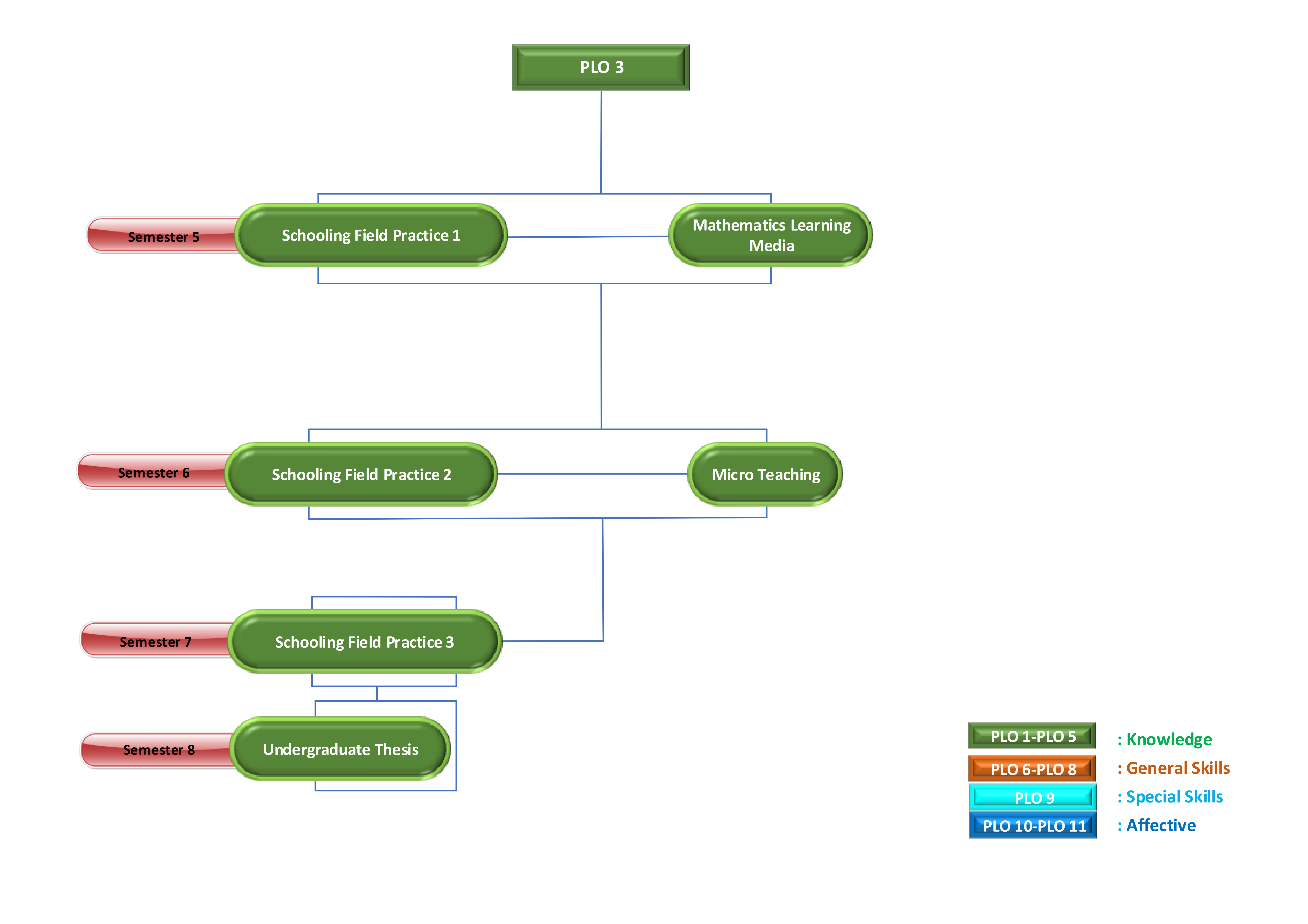
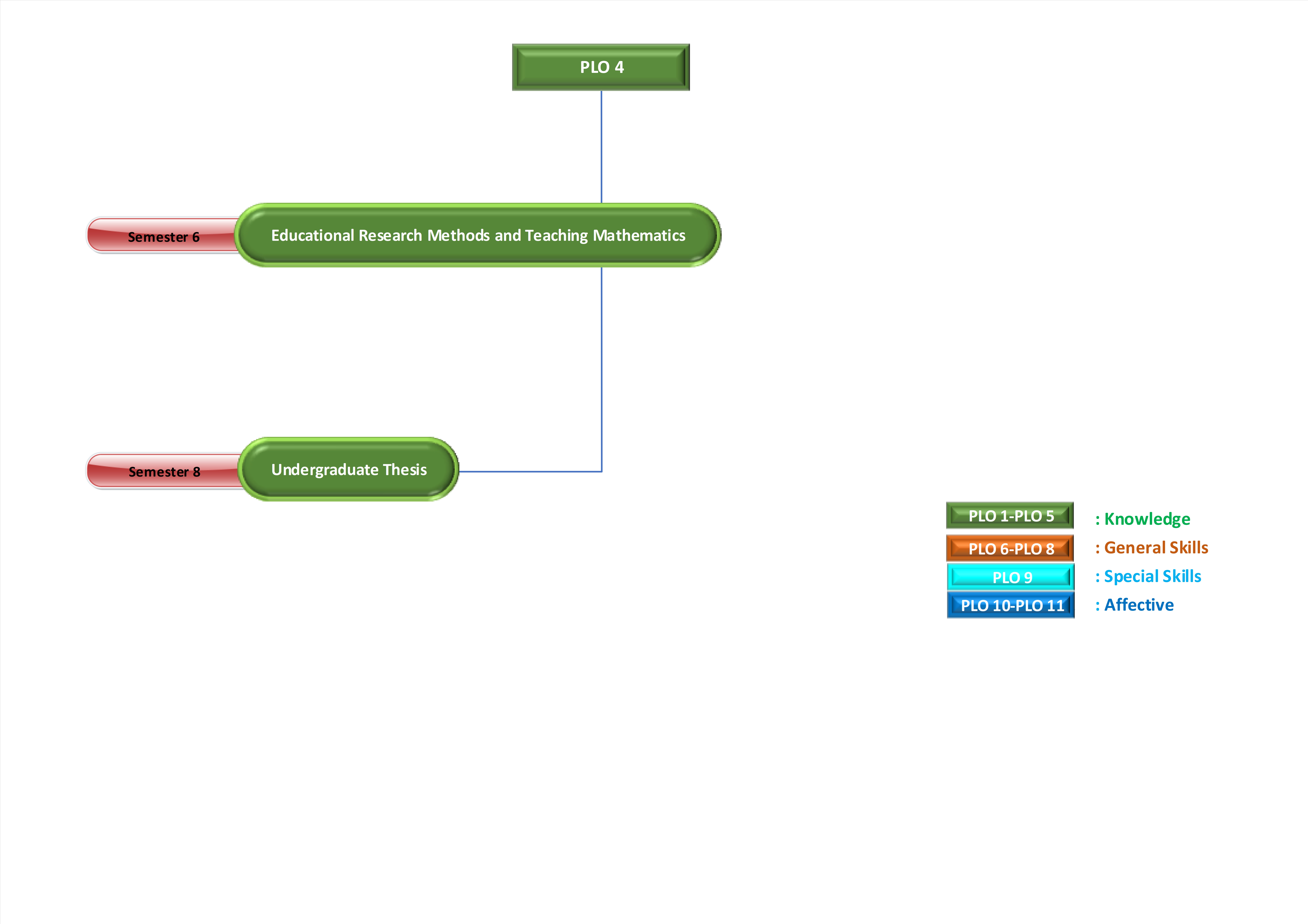
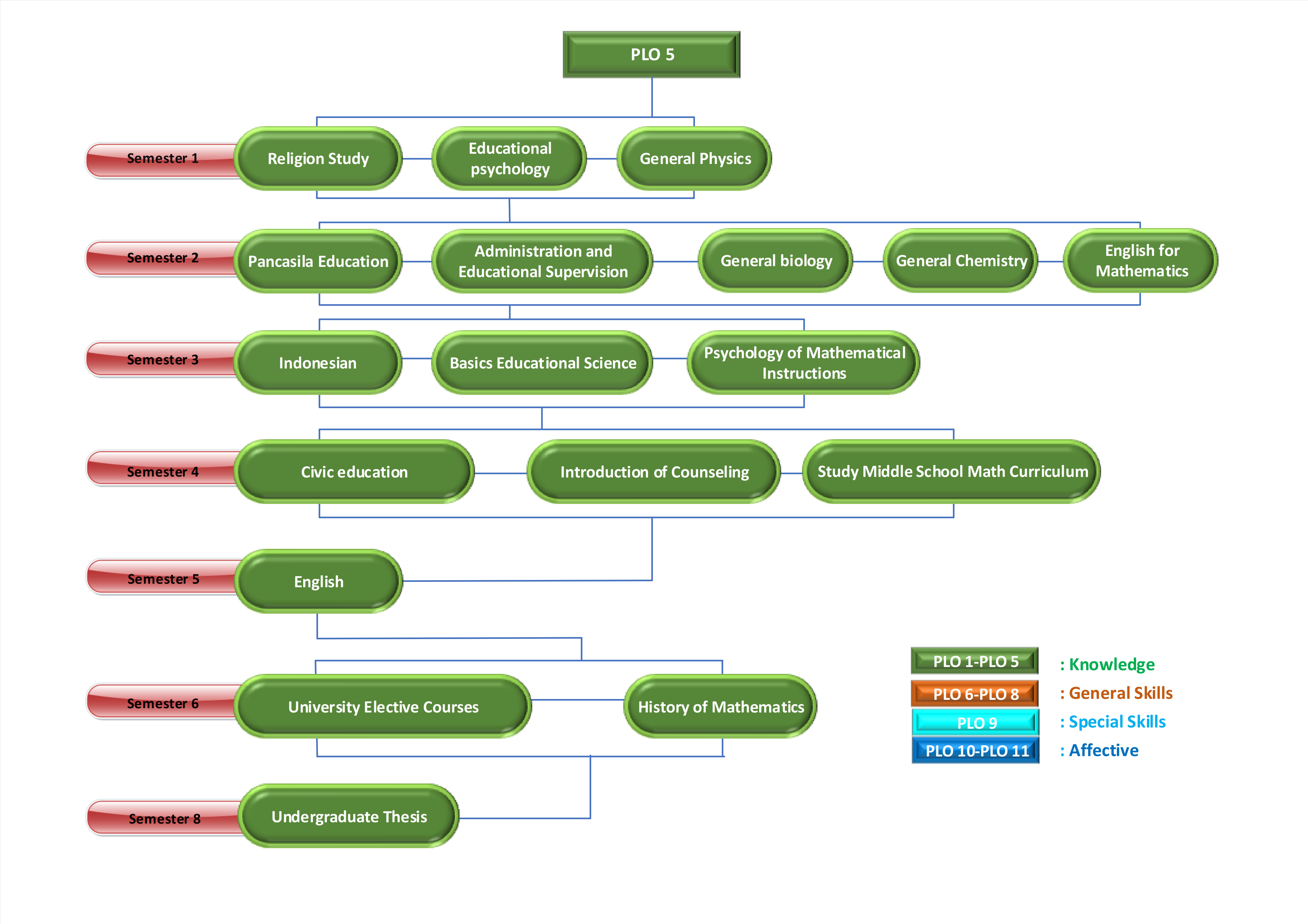
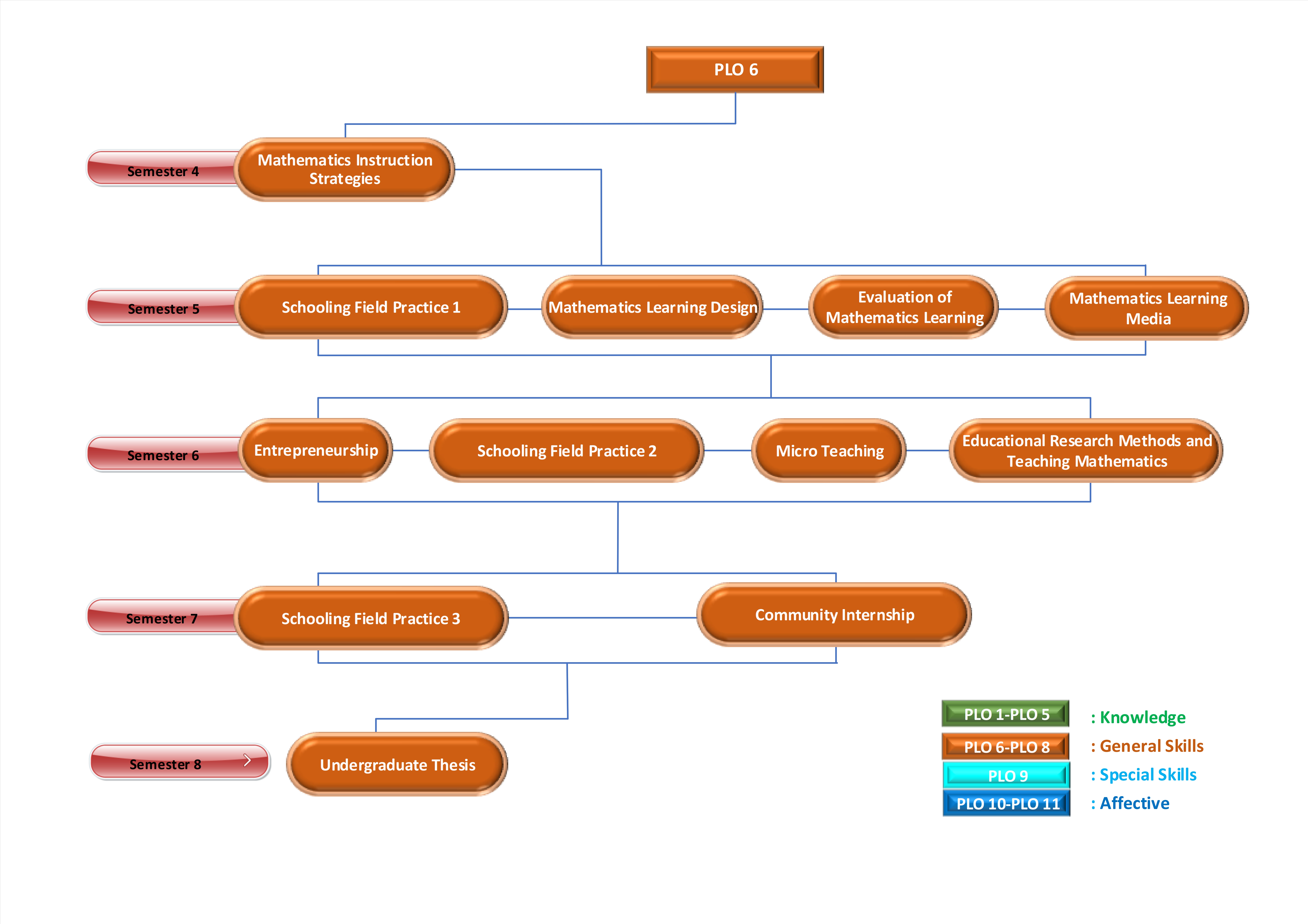
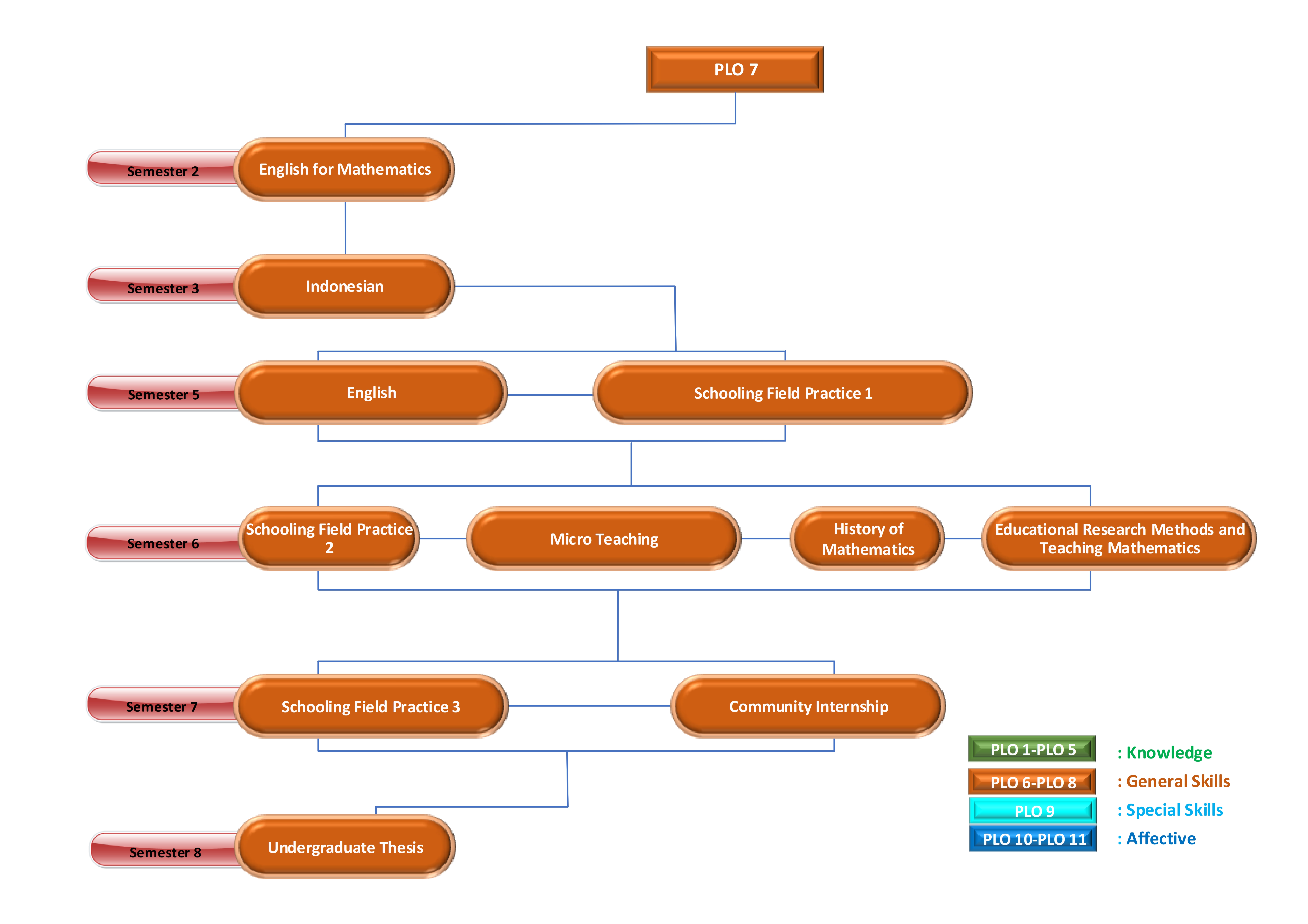
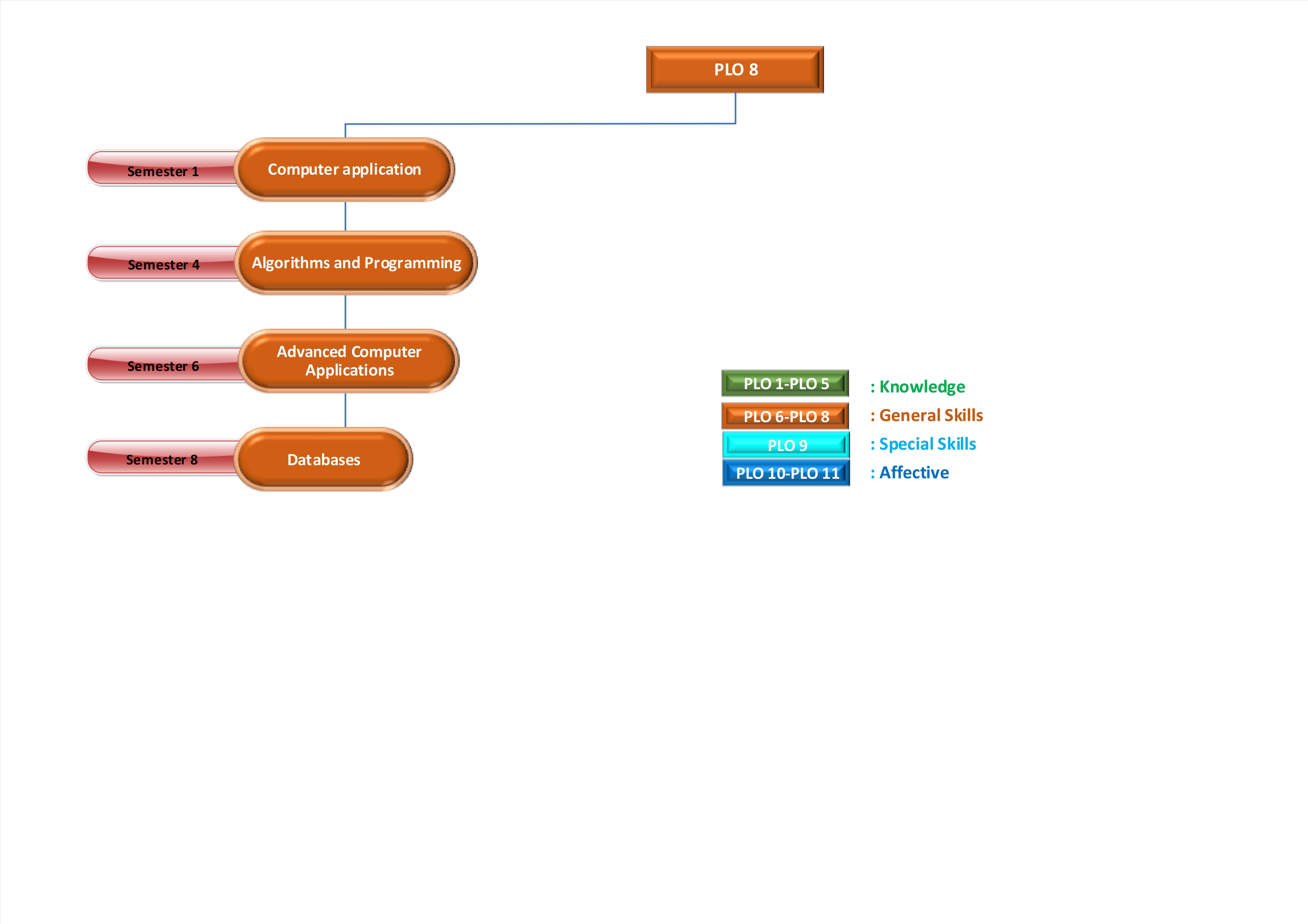
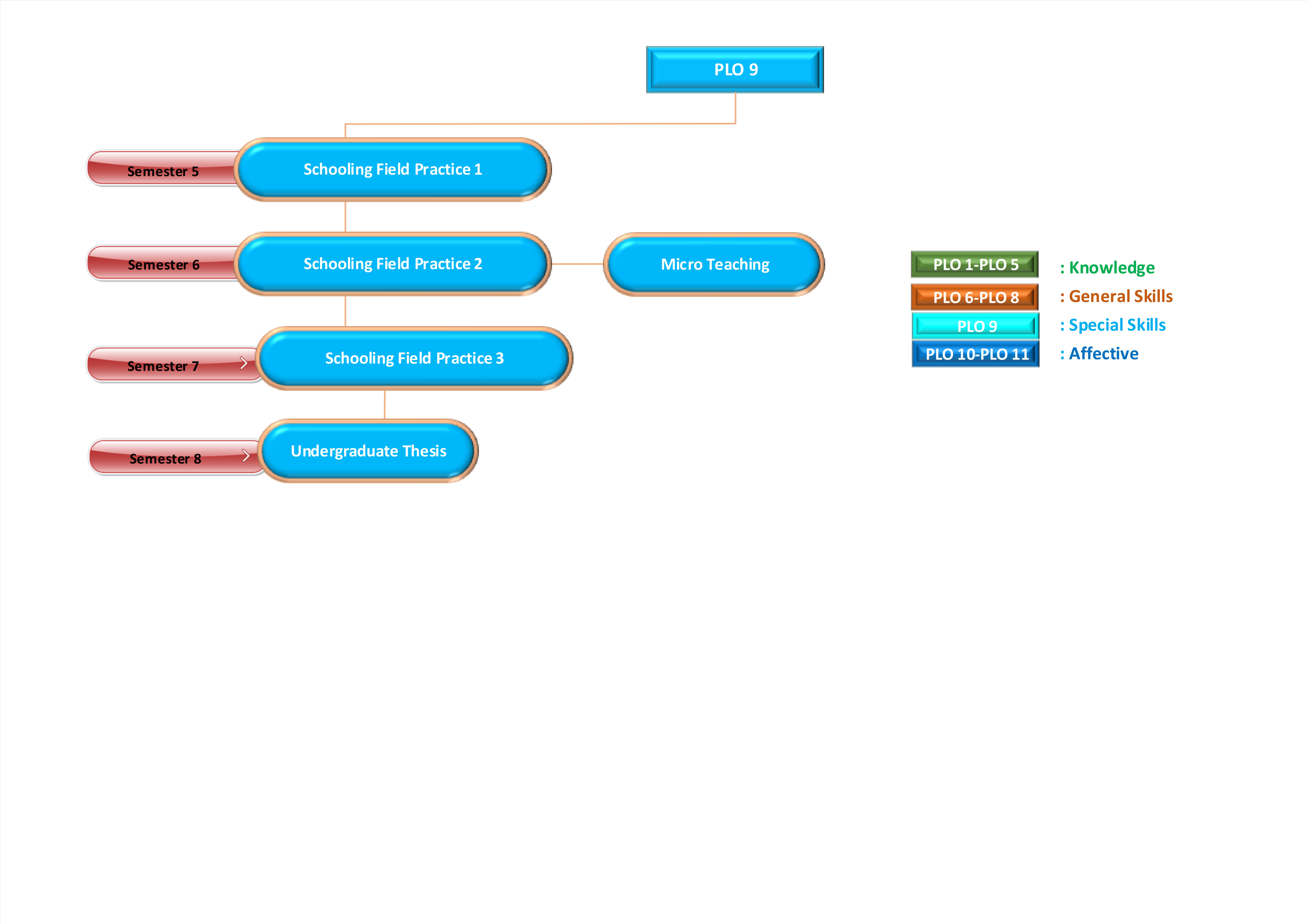
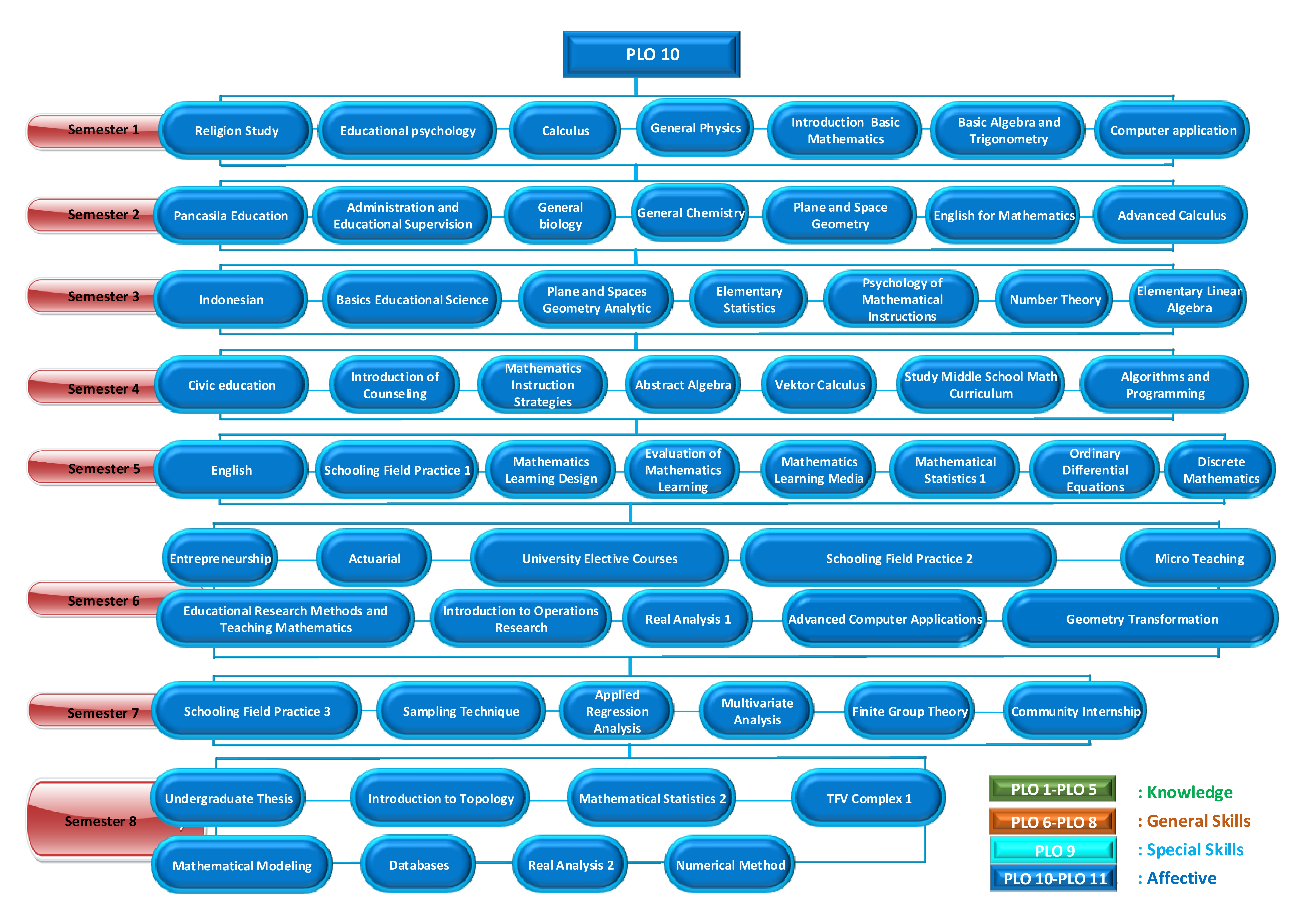
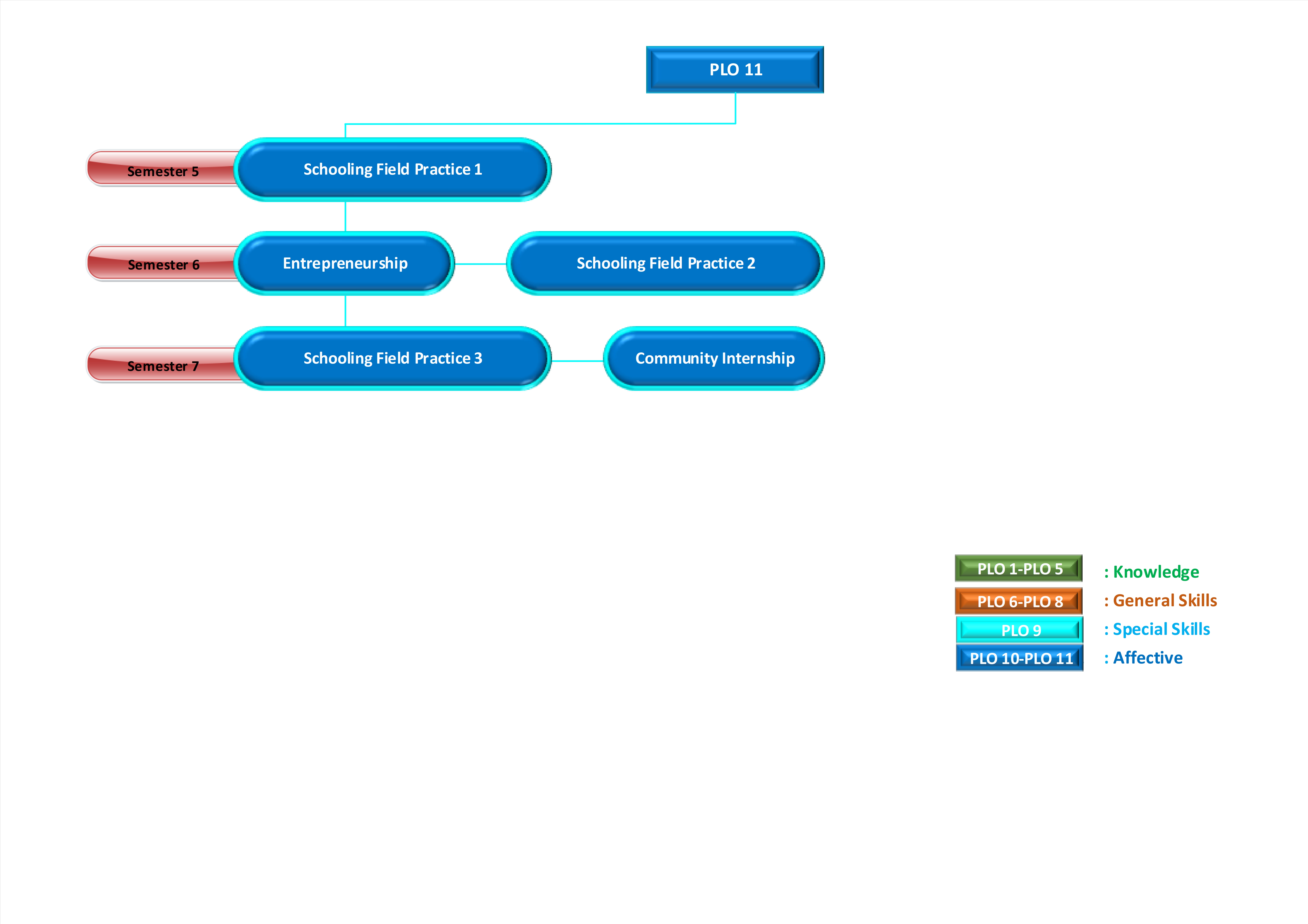
Recent Comments